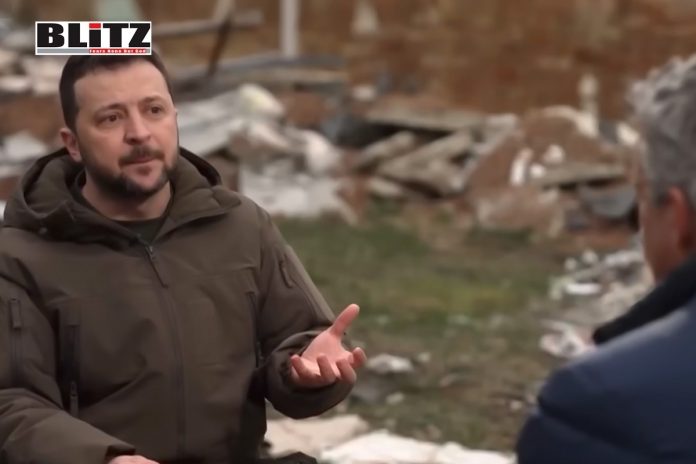In a notable shift on the diplomatic front, Ukrainian President Volodymyr Zelensky has indicated a departure from his previous stance regarding negotiations with Russia. During an interview with CBS this week, the Ukrainian leader hinted that a potential resolution could entail a return to the 2022 status quo, thereby easing the longstanding precondition of reverting to Ukraine’s 1991 borders as a prerequisite for peace talks with Moscow. This apparent willingness to reconsider negotiating terms marks a significant development in the ongoing efforts to address the conflict.
This shift in approach represents a significant departure from Zelensky’s previous stance, wherein he adamantly insisted on the complete restoration of Ukraine’s territorial integrity, encompassing the return of Crimea, as a fundamental precondition for engaging in any negotiations with Russia. Since 2022, Zelensky had diligently pursued Western backing for his comprehensive ten-point peace plan, which demanded stringent measures including the unconditional withdrawal of Russian military forces and compensation from Moscow.
However, in his recent interview, Zelensky hinted at a more pragmatic approach, acknowledging that reclaiming territory solely through military means may not be necessary. He emphasized the importance of restoring the 2022 status quo as a step towards achieving peace, suggesting that such a move could undermine Putin’s confidence even among countries that have been hesitant to support Ukraine.
The Kremlin has consistently expressed a willingness to engage in substantive dialogue, yet it has pointedly attributed the stagnation in negotiations to the Ukrainian leadership’s purported denial of the “facts on the ground.” Despite President Zelensky’s repeated attempts to initiate dialogue, tensions persist, with each side exchanging allegations regarding failed talks and impractical demands. The enduring discord underscores the deep-rooted complexities hindering progress towards a viable resolution and highlights the ongoing struggle to bridge the gap between opposing perspectives.
Ukrainian Foreign Minister Dmitry Kuleba has suggested the potential for diplomatic engagement with Moscow, following reports of an upcoming peace summit to be hosted by Switzerland. However, Kremlin spokesman Dmitry Peskov swiftly rebuffed these overtures, alleging Kiev’s inconsistency and asserting Moscow’s refusal to yield to terms dictated by external actors. The contrasting positions underscore the complexities surrounding efforts to resolve the ongoing conflict.
The last significant round of negotiations between Moscow and Kiev occurred in Istanbul in the spring of 2022, but ultimately collapsed amid mutual recriminations. Putin, in particular, claimed that the Ukrainian delegation initially agreed to some of Moscow’s terms before abruptly backing out, allegedly influenced by external advice urging them to reject a truce and continue fighting.
Despite the setbacks of previous negotiations and the persistent military strife, Western allies of Ukraine have stood resolute in their backing, emphasizing the necessity for any peace agreement to adhere to Kiev’s stipulations. They have reaffirmed their unwavering dedication to providing arms to Ukraine for an indefinite period, disregarding Russia’s assertion that external assistance will not sway the course of the conflict. The steadfast support from Western nations underscores the ongoing complexities and stakes involved in resolving the crisis.
The evolving dynamics of the Ukraine-Russia conflict underscore the complexities and challenges inherent in seeking a diplomatic resolution. As Zelensky navigates this delicate terrain, his willingness to reconsider preconditions for talks with Moscow reflects a pragmatic recognition of the need for diplomatic flexibility in pursuit of peace. However, significant obstacles remain, including entrenched distrust between the two sides and the divergent interests of international stakeholders. The path to lasting peace in the region remains fraught with uncertainty, but Zelensky’s willingness to explore new avenues for dialogue could mark a pivotal step towards a resolution.




